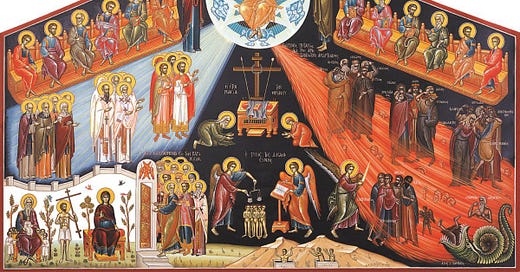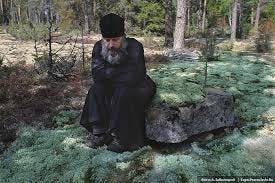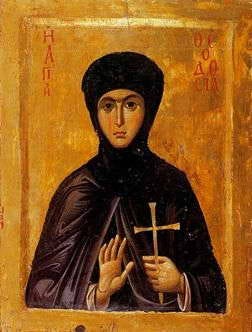“The world suffers nothing from Christians but hates them because they reject its pleasures.”
St. Justin the Martyr
Isaiah 41:4-14
Who has performed and done this, calling the generations from the beginning? I, the LORD, the first, and with the last; I am He. The coastlands have seen and are afraid, the ends of the earth tremble; they have drawn near and come. Every one helps his neighbor, and says to his brother, “Take courage!” The craftsman encourages the goldsmith, and he who smooths with the hammer him who strikes the anvil, saying of the soldering, “It is good”; and they fasten it with nails so that it cannot be moved. But you, Israel, my servant, Jacob, whom I have chosen, the offspring of Abraham, my friend; you whom I took from the ends of the earth, and called from its farthest corners, saying to you, “You are my servant, I have chosen you and not cast you off”; fear not, for I am with you, be not dismayed, for I am your God; I will strengthen you, I will help you, I will uphold you with my victorious right hand. Behold, all who are incensed against you shall be put to shame and confounded; those who strive against you shall be as nothing and shall perish. You shall seek those who contend with you, but you shall not find them; those who war against you shall be as nothing at all. For I, the LORD your God, hold your right hand; it is I who say to you, “Fear not, I will help you.” Fear not, you worm Jacob, you men of Israel! I will help you, says the LORD; your Redeemer is the Holy One of Israel.
Genesis 17:1-9
When Abram was ninety-nine years old the LORD appeared to Abram, and said to him, “I am God Almighty; walk before me, and be blameless. And I will make my covenant between me and you, and will multiply you exceedingly.” Then Abram fell on his face; and God said to him, “Behold, my covenant is with you, and you shall be the father of a multitude of nations. No longer shall your name be Abram, but your name shall be Abraham; for I have made you the father of a multitude of nations. I will make you exceedingly fruitful; and I will make nations of you, and kings shall come forth from you. And I will establish my covenant between me and you and your descendants after you throughout their generations for an everlasting covenant, to be God to you and to your descendants after you. And I will give to you, and to your descendants after you, the land of your sojournings all the land of Canaan, for an everlasting possession; and I will be their God.” And God said to Abraham, “As for you, you shall keep my covenant, you and your descendants after you throughout their generations.
Proverbs 15:20-16:9
A wise son makes a glad father, but a foolish man despises his mother. Folly is a joy to him who has no sense, but a man of understanding walks aright. Without counsel plans go wrong, but with many advisers they succeed. To make an apt answer is a joy to a man, and a word in season, how good it is! The wise man’s path leads upward to life, that he may avoid Sheol beneath. The LORD tears down the house of the proud, but maintains the widow’s boundaries. The thoughts of the wicked are an abomination to the LORD, the words of the pure are pleasing to him. He who is greedy for unjust gain makes trouble for his household, but he who hates bribes will live. The mind of the righteous ponders how to answer, but the mouth of the wicked pours out evil things. The LORD is far from the wicked, but he hears the prayer of the righteous. The light of the eyes rejoices the heart, and good news refreshes the bones. He whose ear heeds wholesome admonition will abide among the wise. He who ignores instruction despises himself, but he who heeds admonition gains understanding. The fear of the LORD is instruction in wisdom, and humility goes before honor.
The plans of the mind belong to man, but the answer of the tongue is from the LORD. All the ways of a man are pure in his own eyes, but the LORD weighs the spirit. Commit your work to the LORD, and your plans will be established. The LORD has made everything for its purpose, even the wicked for the day of trouble. Everyone who is arrogant is an abomination to the LORD; be assured, he will not go unpunished. By loyalty and faithfulness iniquity is atoned for, and by the fear of the LORD a man avoids evil. When a man’s ways please the LORD, he makes even his enemies to be at peace with him. Better is a little with righteousness than great revenues with injustice. A man’s mind plans his way, but the LORD directs his steps.
Virgin Martyr Theodora of Tyre
Saint Theodora came from Tyre in Phoenicia. When she was seventeen years of age, she was brought before Urban, the ruler of Palestine, who asked her if she really believed in Christ. With remarkable courage, the holy virgin confessed that she truly believed. Then they flayed her sides and her breasts. Afterward, they threw her into the sea, where she surrendered her soul to God, thereby receiving a martyr's crown.
Saint Νikόdēmos of the Holy Mountain thought it very likely that this Saint is the same as Saint Theodosia (May 29), because their Lives are almost identical.
The Geography of Heaven and Hell
Fr. Stephen Freeman
A timely reprint – for thinking about heaven and hell. I continue to be amazed at the literalism that infects the minds of many Christians. Just because Scripture uses the language of geography to describe something does not at all mean that we should assume that it is referring to a literal geography. Those whose imaginations are filled with various versions of heaven and hell in literal terms – it seems to me – lack imagination. The accounts of Christ after the Resurrection, though marked occasionally with very physical descriptions, are clearly marked as well with things that defy everything we know of physicality.
His Resurrection is the only “image” of a tangible/non-tangible sort that we can point to for the character of life after death. Some Christians so lack imagination that they won’t let Christ off a literal throne in heaven and use such nonsense to deny the complete reality of the transformation of the Eucharist into His body and blood. In earlier centuries of the Church, such notions would (and were ) declared heresy by the Fathers. How can we worship God in awe and wonder when He is reduced to such understandable terms? Jesus Christ is Lord and His resurrected existence is the only measuring stick (if you will) of reality.
The parable of the Rich Man and Lazarus (Luke 16:19-31) has a long history of teasing Christians into dangerous territory. I suspect that many if not most Christians have more than a little curiosity about life after death. We want to know what happens. We want to know “how things work.” And this parable – at least on its surface – seems to give more indication of “how things work” than almost any other passage in Scripture.
It gives us a geography of sorts: Lazarus is in “Abraham’s bosom” apparently enjoying good things; the rich man is in Hades and in torment; we are told that there is a “great gulf fixed between the two” so that no one can come from Hades to Abraham’s bosom and no one from Abraham’s bosom can go to Hades.
It interests me that many Christians use this parable as a “map” of the after-life, or at least as a story that supports their own “map” of life after death.
The most important feature of such maps is the very “fixed” character of their geography. What seems most important to them is that one character is in one place and the other character is in another place and there is no traffic between the two. (To read some useful Orthodox thought on life after death and Christ descent into Hades – the following article is of interest.)
It would seem that the reason some Christians like this is that it fits their own map of God and life after death. There are those who seem to like things to be stable and unchangeable – by this I mean they want a life after death (and a life before death) with clearly defined rules, boundaries, unbending laws and the like.
In such a map of things – those who obey the rules, observe the boundaries and master the laws do well. Those who do not – are punished. Such a world, it seems to them, is the way things ought to be, and to be the best way to either reward the good, correct the bad, or punish the incorrigible.
I might add that if you want a world like this – then it is even better if you can find a way to secure God as its underwriter. Many people do this under the heading of the “justice of God.” They will say that “God is just and He cannot deny His justice,” thus forcing God to have very clear rules and guaranteeing that He cannot break His own rules.
Several things to note:
1. There are no maps of the afterlife. Regardless of the descriptions in this parable – the purpose of the parable is not to teach us the topography of heaven and hell. Where, I will ask, is Abraham’s Bosom? How do we think of this as a place? Hades has the same problem – where do you place it? As for the Great Gulf – of what does the gulf consist? What sort of obstacle is insurmountable in these circumstances?
The point of the parable is found in its end: “If they have not listened to Moses and the Prophets, neither would they listen to someone even if he came back from the dead.” It is not a parable about the topography of the after-life, but a comment about our present life and our unwillingness to hear the gospel.
2. There are no rules which God must not break. Important, and please note carefully: no matter how much some may want the world – particularly God’s world – to be describable in clearly defined rules, boundaries and unbending laws – it’s just not the case. If there is a “rule” of any sort – it is God Himself – it is Personal – and is defined only by mercy, love and kindness.
And so it is that the “Way” forward, backwards, up or down, however you want to describe our travel in the Kingdom of God – the Way only follows the map of the heart of God. If you want to know the way to go – if you want to know how things work – then you have to know the heart of God. You have to know God Himself.
And this is all that we need to know for life here – and life hereafter. God Himself is our heaven – and in the teachings of the Fathers – God Himself is our hell – for hell is nothing other than our self-imposed refusal to accept the love of God. It is that refusal that brings its own torment.
If we have the eyes to see – we are already traveling the roads of heaven and hell – already dwelling in the bosom of Abraham or in the torments of Hades. The geography of that journey is the geography of love and mercy, kindness and forgiveness – or contrary – hatred and judgment, violence self-conceit, slander and calumny.
Judge for yourself – for we’ve all experienced both. Where do you want to dwell? The good news is that whatever gulf is fixed in our heart – whatever wall or chasm has been erected within us – Christ has gone there. He descended into Hades. If you will look within yourself – into the darkness of your own private hell – you will find Christ there – for He has gone there to look for you. And as sure as He trampled down death by death – He can trample down your own hell and translate you into the Kingdom of light.
This week’s calendar reminders:
Monday 3/31: Lenten Matins 8:30 a.m.
Tuesday 4/1: no services or events
Wednesday 4/2: Presanctified Liturgy 6:30 pm (potluck meal to follow)
Thursday 4/3: no matins; Canon of St.Andrew 7 p.m.
Friday 4/4: Paraklesis to the Theotokos 8:30 am
Saturday 4/5: Catechumen Class 4:30 pm; Choir Rehearsal 4:30 pm; Great Vespers 6 pm
Sunday 4/6: Divine Liturgy 9:15am;
CLICK BELOW to donate online:
Christ the Savior Orthodox Church is located in Southbury, Connecticut, and is part of the New England Diocese of the Orthodox Church of America.
Mailing address: Christ the Savior Church, 1070 Roxbury Road, Southbury, CT 06488
PLEASE DONATE to help our parish do the work of the Lord, thrive and grow, and extend the Kingdom of God. May the Lord bless your generosity!
Fr. Moses Locke can be reached at frmoseslocke@gmail.com











